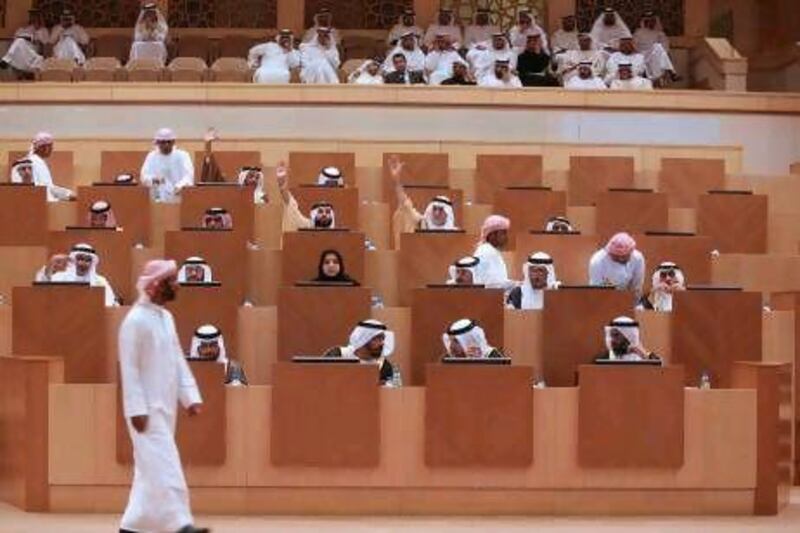ABU DHABI // With low political awareness among the public, more appointed members of the Federal National Council (FNC) are needed to ensure representation and efficiency that elections alone cannot provide.
That's the verdict of council members - including elected ones - and political analysts who were responding to a story written by the head of Islah, the UAE branch of the Muslim Brotherhood, and published on The Guardian newspaper's website.
While also referring to a petition made in March last year calling for all councillors to be elected, FNC members said appointments were important to compensate the council for professionals that did not make it in through elections.
As it stands, political awareness is not great enough in the UAE to ensure the best people for the council would get in, said Dr Sultan Al Moazzen, an outspoken former FNC member from Fujairah.
"We notice from the last elections that there was not a lot of interest or regard to the elections, which was clear by the low turnout," he said. "Knowledge is still not high. We should not look at 200-year-old countries and compare ourselves to them."
Understanding of the work the FNC carried out was also low, he added, which could lead to the wrong candidate reaching the council.
He gave the example of those who did vote often ending up voting for people in their family or tribe.
"This is not just in the UAE but other countries," said Dr Ebtisam Al Kitbi, a political-science professor at UAE University. "It is normal for people with little awareness to not pick the best but someone just for their name."
Noora, a mother of three from Abu Dhabi, admitted that she voted for others in her extended family. "[My family] voted for people we knew personally," she said.
In Abu Dhabi city, three people from the same tribe, Al Ameri, were voted in to the council. Of the candidates elected, many were surprised as they were not known throughout the emirate, nor did they advertise as much as other candidates.
And with many election candidates not possessing the required expertise needed to deal with some FNC issues, many members believe appointments were necessary.
The last FNC election was an example of this as six women were appointed alongside only one elected female, while other prominent Emirati professionals became members through appointment.
Dr Al Moazzen explained the nature of the FNC session meant every field needed to be represented so that members could discuss laws efficiently.
"The appointment allows the government to bring in to the council unrepresented people and experts from different areas," he said.
"This is the intention, to create a balance," Dr Al Kitbi said. "If the elections did not bring in the right people, there would still be an opportunity to do so through appointments."
Dr Abdulrahim Al Shahin, a RAK FNC member first elected in 2006 and later appointed last year, agreed.
"Elections will not necessarily pick the best, but appointments will help address the shortfalls," he said. "And if we look at the work of the members, we cannot say one is better than the other. Some appointed members are good and some elected members are equally good."
Ali Al Nuaimi, an appointed member from Ajman who is known for doing a good job holding ministers to account, said this approach was "logical". "If all members were elected, maybe there would be people that do not have the means, they might be popular without academic qualifications and unable to participate actively," he said.
And while Dr Al Kitbi said she would like to see the council be given more teeth, FNC members said it has already changed drastically in the past few years, with more change likely.
"There is a political programme from the president, which is gradual," Dr Al Shahin said. "All countries went through steps. In the past four years a lot of changes have come about and, with time, change will increase."
Dr Al Moazzen said the way the government interacted with the council shows how highly it was valued.
"A lot more of its recommendations are accepted by the cabinet and carried out," he said.
"There is communication between the council and leaders. The work of the FNC is not just in the building, but also outside. Sometimes it has better outcomes than in the building. When the government sees the shortfalls, they address them."
The members all concluded that for the time being, this was the best approach for the council and the government has made clear indications that the process was evolving.






